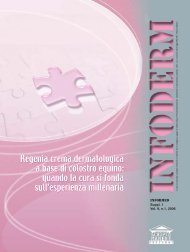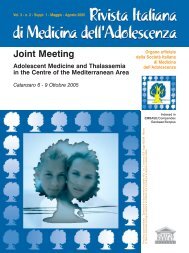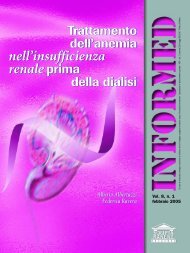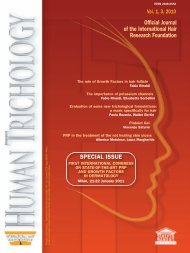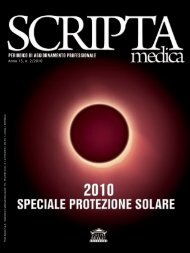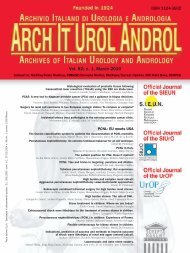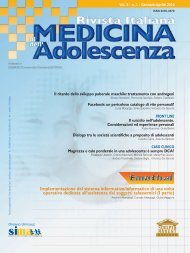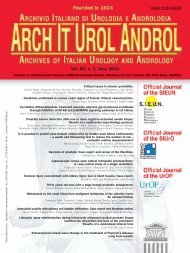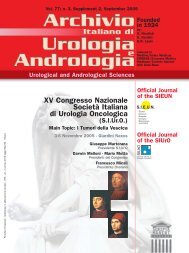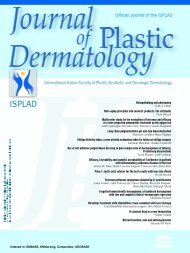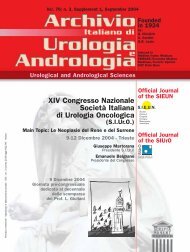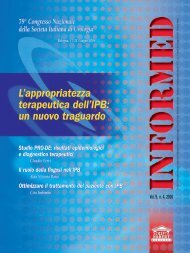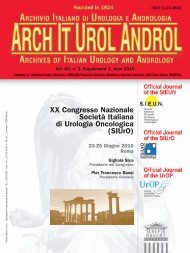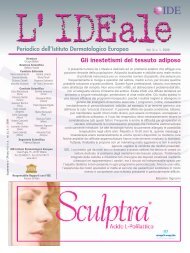XVIII Congresso Nazionale Società Italiana di Urologia Oncologica[(11)C]choline-PET/CT study. The detected LNMs receivedhigher dose thank to the technique of simultaneous integratedboost allowed by HTT. The doses ranging from 42Gy in 6 fraction(tomediastinal ilum area) to 67.2 in 28 fractions. However18/21 were treated in 23-28 fractions with doses from 57.5 to67,2 Gy. All patients had previously received hormonal deprivationand 4/21 also estramustine and/or taxotere.Chemotherapy or hormonal therapy were not changed duringthe <strong>per</strong>iod of Tomotherapy treatment.Results: The treatment was well tolerate. Only 8/21 pts ex<strong>per</strong>imentedG1 acute toxicity. Only 1 G2 up<strong>per</strong> Gastrointestinaland 1 G2Genito-urinary were recorded. There weren’t G3-G4acute side effects during and the 90 days after treatment. Nopts with minimum follow up greater than 3 months showedlate toxicity. 8/12 with post treatment TC/PET presentedComplete Response, 4/12 had Partial Response> 50%. None ofthe 21 pts had progression in irradiated area and 3 pts showeddisease in other sites. One patients died for tumour progression.The median follow-up for the entire group was 12 months(3-24). 19/21 pts documented a significant reduction of PSAvalue after HTT.Conclusions: High dose moderate hypofractionated HTT[(11)C]Choline- PET/CT guided is safely and efficacy. The good rate oflocal control registered, suggest that radiotherapy could be avalid treatment in prostate pts with lymph nodal relapse.Obviously we need a longer follow-up and more patients fordefinitive conclusion.Abstract n. 108 COMUNICAZIONE (sessionedel <strong>26</strong>/11/<strong>2008</strong>, Comunicazioni Prostata 1)TRATTAMENTO CON DOCETAXEL (D) RI-SENSIBILIZ-ZANTE ALLA ANDROGENO DEPRIVAZIONE NEI PAZIEN-TI (PTS) AFFETTI DA CARCINOMA PROSTATICO ORMO-NO-REFRATTARIO (HRPC)Di Gregorio L. 1 , Di Trapani D. 2 , Borsellino N. 31Policlinico Universitario Palermo; 2 Policlinico UniversitarioPalermo (studente); 3 Ospedale Buccheri la Ferla PalermoIntroduzione: Il tumore della prostata è il più comune tumore diagnosticatonegli uomini e rappresenta un grosso problema <strong>per</strong> lasalute. Sebbene docetaxel rappresenti una importante pietramiliare nella terapia ed è l’attuale standard di cura <strong>per</strong> il cancrometastatico ormono-refrattario della prostata, molti pazienti,vanno incontro a progressione di malattia a causa della selezionedi cloni cellulari terapia-resistenti o dello sviluppo di cellule afenotipo farmaco-resistente. Anche se le linee guida ASCO(Basch EM et al, JCO 25:5313-5318,2007) raccomandano dicontinuare la terapia con soppressione androgenica <strong>per</strong> gli uominiche ricevono il trattamento chemioterapico, ci sono poche evidenzein letteratura che supportano tale decisione.Scopo del lavoro: Noi ipotizziamo che il trattamento con docetaxelpossa essere in grado di ri-sensibilizzare le cellule tumoralial trattamento ormonale rendendo, <strong>per</strong>tanto, inutile il co-trattamentochemio-ormonale ab initio.Risultati: Dal settembre 2006 abbiamo trattato 10 pazienti affettida carcinoma prostatico ormono-refrattario con docetaxel inassociazione a prednisone, sospendendo la deprivazione androgenicaall’inizio della chemioterapia. Abbiamo ripreso il trattamentoormonale all’incremento del PSA dopo chemioterapia.Dopo trattamento con docetaxel abbiamo osservato 6 risposte(4 pazienti con riduzione del PSA
XVIII Congresso Nazionale Società Italiana di Urologia Oncologicapazienti trapiantati di rene, specialmente nei pazienti conACKD. Noi consigliamo una ecografia ogni 12 mesi dopo il trapianto,e ogni 6 mesi nei pazienti più a rischio <strong>per</strong> la presenzadi ACKD. Linee guida più dettagliate sono necessarie.Abstract n. 110 COMUNICAZIONE (sessionedel <strong>26</strong>/11/<strong>2008</strong>, Comunicazioni Vescica)CONFRONTO PROSPETTICO FRA CITOLOGIA URINARIAE FISH IN 150 PAZIENTI CONSECUTIVI AFFETTI DA TCCDELLA VESCICAMaffezzini M., Capponi G., Campodonico F., Casazza S. 1 ,Canepa G., Bandelloni R. 1SC Urologia, 1 SC Anatomia Patologica, EO Ospedali Galliera, GenovaIntroduzione e Obiettivi: La procedura standard <strong>per</strong> la diagnosi ditumore a cellule transizionali della vescica (BTCC) è la cistoscopia.La citologia urinaria rappresenta il più comune ausilio<strong>per</strong> aumentare la potenza diagnostica sia <strong>per</strong> la diagnosi primariache <strong>per</strong> il follow-up. L'indagine biomolecolare FISH(Urovision Vysis) è in grado di identificare le cellule transizionaliportatrici di aberrazioni cromosomiche esfoliate dalla vescicae raccolte nelle urine. Abbiamo confrontato la sensibilità dellacitologia urinaria e della FISH in pazienti con diagnosi di BTCCin relazione a stadio, grado, ricorrenza e progressione.Pazienti e Metodi: Dal maggio 2003 al dicembre 2007 150 campionidi urine spontanee sono stati raccolti da 150 pazienti. Il78% erano maschi (127 pz) ed il 22% femmine (23 pz), l'etàmedia 69 anni ed il follow-up medio 31.6 mesi. I campioni diurina raccolti prima della biopsia sono stati sottoposti ad esameistologico e FISH. L'esame FISH è stato eseguito utilizzandosonde <strong>per</strong> i centromeri dei cromosomi 3,7,17 ed il locus 9p21.Tutti i pazienti sono stati sottoposti a TURV o mapping vescicale<strong>per</strong> il sospetto di BTCC in relazione allacistoscopia o all'esame citologico/FISH.Risultati: Il TCC vescicale, identificato in <strong>tutti</strong> i 150 pazienti, èstato diagnosticato secondo stadio e grado rispettivamente: Tain 33/65 pz (50.7%) con FISH verso 11/65 (16.9%) con la citologia;T1G1 in 18/24 pz (75%) verso 9/24 pz (37.5%); T1G2-3 in 36/44 pz (81.8%) verso 32/44 pz (72.7%). Per ricorrenzae progressione sono state confrontati i pazienti FISH positivi vsCitologici positivi mediante test esatto di Fisher in un gruppodi 143 pz. Nel gruppo valutato <strong>per</strong> ricorrenza (61 pz) sonoerano FISH+ 45/61 pz (73.7%) e Cit+ <strong>29</strong>/61 pz (47.5%),p=0.005. Nel gruppo in cui vi è stata progressione (24 pz)erano FISH+ 21/24 pz (87.5%) e Cit+ 14/42 pz (58.3%),p=0.049. Nelconfronto <strong>per</strong> pazienti liberi da malattia p=0.014.Conclusioni: L'esame FISH dimostra una su<strong>per</strong>iore sensibilitàdiagnostica (identificazione dei veri positivi) rispetto alla citologiatradizionale. I pazienti con FISH positiva devono attentamenteessere monitorati nel tempo <strong>per</strong> l'elevata probabilità direcidiva e di progressione.Abstract n. 111 COMUNICAZIONE (sessionedel 28/11/<strong>2008</strong>, Comunicazioni Prostata 2)RECUPERO DELLA CONTINENZA URINARIA DOPO PRO-STATECTOMIA RADICALE: DATI CLINICI ED IMPATTODELLA TERAPIA RIABILITATIVAMarchiori D., Bertaccini A., Manferrari F., Schiavina R.,Franceschelli A., Sanguedolce F., Martorana G.Clinica Urologica Alma Mater Studiorum Università degli Studi diBologna Clinica Urologica Alma Mater Studiorum Università degliStudi di BolognaScopo del lavoro: impatto di un <strong>per</strong>corso riabilitativo del pavimentopelvico <strong>per</strong>sonalizzato sul recu<strong>per</strong>o della continenzadopo prostatectomia radicale.Materiali e Metodi: studio randomizzato su176 pazienti (pz)affetti da neoplasia prostatica (cT2), sottoposti a prostatectomiaradicale tra il 2007 e <strong>2008</strong>. Ad un mese dalla rimozione delcatetere vescicale i pazienti incontinenti ( >1 pad/die ) sonostati randomizzati: gruppo A 89 pz: continua la ginnasticadomiciliare (30 contrazioni <strong>per</strong>ineali fasiche, rapide e lente, <strong>per</strong>3 volte al giorno) appresa alla rimozione del catetere vescicale;gruppo B: 87 pz inseriti in un programma di training <strong>per</strong>sonalizzatoa seconda del tipo e della gravità dell’incontinenza (unciclo di elettrostimolazione del piano <strong>per</strong>ineale +/- associato adesercizi mirati al recu<strong>per</strong>o della funzionalità dello sfintere uretrale,nonché una guida all’utilizzo dei vari presidi) in aggiuntaalla ginnastica domiciliare. Il paziente veniva assistito da <strong>per</strong>sonalemedico-infermieristico dedicato con una frequenza di 3giorni/settimana <strong>per</strong> un totale di 10 sedute presso il nostro centro.A 3, 6, e 12 mesi i controlli di follow up <strong>per</strong> entrambi igruppi. Il grado di continenza urinaria veniva valutato mediantecolloquio clinico (numero pad/die).Risultati: Gruppo A: 31 pz continenti (0-1 minipads/die) a 3 mesi,30 pz a 6 mesi, 24 pz a 12 mesi. Gruppo B: 65 pz continenti a 3mesi (35 pz sottoposti ad un ciclo di elettrostimolazione del piano<strong>per</strong>ineale e 30 pz ad un ciclo di elettrostimolazione del piano <strong>per</strong>inealeassociato a esercizi di automazione e biofeedback), 22 pzcontinenti a 6 mesi (13 pz sottoposti ad un ciclo di elettrostimolazionedel piano <strong>per</strong>ineale e 9 pz ad un ciclo di elettrostimolazionedel piano <strong>per</strong>ineale associato a esercizi di automazione ebiofeedback) e <strong>tutti</strong> i pazienti continenti a 12 mesi.Discussione: l’intervento di prostatectomia radicale rappresentauna delle principali cause di incontinenza urinaria legata aldanno sulle strutture muscolari e neurovascolari del pavimentopelvico. In letteratura le <strong>per</strong>centuali di recu<strong>per</strong>o della continenzaurinaria variano dal 7% all’87% <strong>per</strong> la discrepanza tra ledefinizioni di continenza. Non esiste consenso unanime tra gliautori nel definire che la riabilitazione <strong>per</strong>ineale sia determinate<strong>per</strong> la risoluzione del problema, soprattutto <strong>per</strong> le incontinenzedifficili, ma ne viene riconosciuto un ruolo nei tempi direcu<strong>per</strong>o in quanto agisce incrementando la forza muscolare edil controllo sfinteriale.Messaggio conclusivo: dallo studio emerge che i pazienti sottopostiad un programma riabilitativo mirato associato un supportomedico-psicologico favorisca un più precoce recu<strong>per</strong>o della continenzadopo prostatectomia radicale rispetto alla popolazione dipazienti che eseguono da soli esercizi a domicilio.Abstract n. 112 POSTER (sessione del 28/11/<strong>2008</strong>,Presentazione poster Miscellanea 2)TURBT RADICALE E CONTESTUALE SALVATAGGIO ENDO-SCOPICO DI UNITÀ RENALE IDRONEFROTICO-ESCLUSAGritti A., Tiraboschi B., Morosini D., Fenice O.U.O. Urologia, Policlinico San Pietro, Ponte San Pietro (BG)Introduzione: Da anni pratichiamo resezioni endoscopiche semprepiù spinte di tumori vescicali infiltranti e di alto grading, in ordinedi evitare la cistectomia e quindi le sue gravi conseguenze sullaqualità di vita del paziente. Oggi possiamo dire che la prognosi,tra i due tipi d’intervento è <strong>per</strong>fettamente assimilabile in ordine dianni di sopravvivenza. L’associazione sistematica con la chemioterapiaadiuvante, assolutamente ben tollerata, ha aggiunto senz’altroun’ulteriore sicurezza a tale pratica endoscopica.Materiale e Metodi: Negli ultimi 10 anni abbiamo trattato almeno50 casi di tumore monofocale o plurifocale avanzato, infiltrantetrigono e\o papilla ureterale, senza pregiudizi di indicazione senon quelli di potere, alla fine, avere asportato sicuramente tutta laneoformazione, fino al cellulare <strong>per</strong>ivescicale, aprendo pure, anzivolutamente, ampie finestre alla vescica, che si riparano in fretta,mantenendo <strong>per</strong> soli 4-5 giorni il catetere a dimora. Solo tre volteè stato necessario porre un trocar <strong>per</strong>ivescicale <strong>per</strong> sindrome da100Archivio Italiano di Urologia e Andrologia <strong>2008</strong>, 80, 3, Supplemento 1



